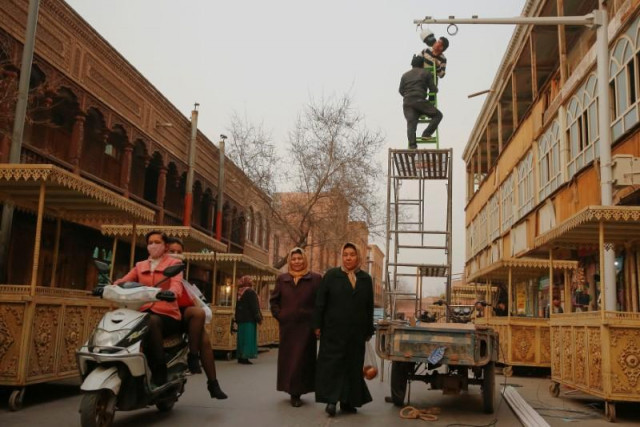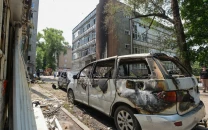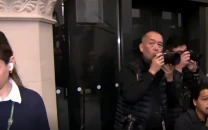China says 'terror and separatist' risks in Xinjiang remains serious despite security push
Governor says 2017’s campaign makes it clear that stabilizing society in Xinjiang will require more measures

Men install a CCTV camera in a shopping street in the old town of Kashgar, Xinjiang Uighur Autonomous Region, China. PHOTO: REUTERS
China says Xinjiang faces a serious threat from extremists and separatists who plot violent attacks and stir up tensions between the mostly Muslim Uighur minority who call the region home and the ethnic Han Chinese majority.
China bans religious names for Muslim babies in Xinjiang
In response, the government has organized mass police rallies and rolled out new surveillance and anti-terror measures throughout the region, including thousands of newly installed street-corner police stations in cities and towns.
A report first read at a government meeting on Jan 22 by governor Shohrat Zakir and published on the official Xinjiang Daily newspaper said that 2017’s campaign had made it clear that stabilizing society in Xinjiang would require more measures.
Xinjiang province in China will build 'Great Wall' to protect borders: Governor
“There has been no fundamental change to the situation of Xinjiang being in a time of regular violent terror activities, an intense struggle against separatists and the painful throes of an intervention treatment,” Zakir said.
He added that the long-term peace and stability of Xinjiang and its society must be the overall goal of the regional government for the “critical period” of the next five years.
China official says Xinjiang's Muslims are 'happiest in world'
To meet this goal, the government will continue to deepen severe specialist operations, such as guaranteeing absolute security of key areas and the “normalization” of preventative measures in society, Zakir said.
China blames the violence in Xinjiang on extremists and separatists, some of whom it says have links to groups outside the country.
Rights groups and Uighur exiles say it is more a product of Uighur frustration at Chinese controls on their culture and religion. China denies any repression.



















COMMENTS
Comments are moderated and generally will be posted if they are on-topic and not abusive.
For more information, please see our Comments FAQ